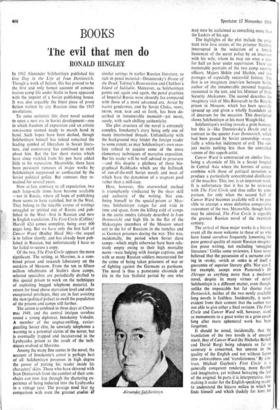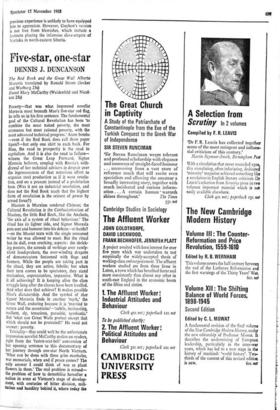The evil that men do
BOOKS
RONALD BINGLEY
In 1962 Alexander Solzhenitsyn published his One Day in the Life of Ivan Denisovich. Though a work of fiction, this has proved to be the first and only honest account of concen- tration camp life under Stalin to have appeared with the imprint of a Soviet publishing house. It was also arguably the finest piece of prose fiction written by any Russian since the 1917 revolutions.
To some optimists this short novel seemed to open a new era in Soviet development—one in which freedom of expression and an artistic renaissance seemed ready to march hand in hand. Such hopes have been dashed, though Solzhenitsyn himself has indeed remained the leading symbol of liberalism in Soviet litera- ture, and controversy has continued to swirl about him. But the few short stories which have since trickled from his pen have added little to his reputation. Meanwhile, there have been persistent rumours of major works by Solzhenitsyn suppressed or confiscated by the Soviet political police. But rumours they re- mained for several years.
Now at last, contrary to all expectation, two such large-scale items have become available —not in Russia, where all hope of publishing them seems to have vanished, but in the West. They belong to the sizeable corpus of writings smuggled or spirited out of Russia and pub- lished in the West—first in Russian and now in English translation. The First Circle (Collins/ Harvill 42s) comes complete, being over 600 pages long. But we have only the first half of Cancer Ward (Bodley Head 30s)—the sequel is to follow shortly, and has already been pub- lished in Russian, but unfortunately I have so far failed to secure a copy.
Of the two, The First Circle appears the more significant. The setting, at Mavrino, is a com- bined prison and research laboratory on the outskirts of Moscow. From the ten to fifteen million inhabitants of Stalin's slave camps, selected specialists are periodically drafted to this special prison to work on the techniques of exploiting bugged telephone material. In return for food above starvation level and other exceptional privileges, they are in fact assisting the MOB (political police) to swell the population of the prisons and camps still further.
The action is confined to three days at Christ- mas 1949, and the central intrigue revolves round a young diplomat, Innokenty Volodin. A member of the cognac-swilling, caviar- guzzling Soviet elite, he unwisely telephones a warning to a potential victim of the terror, but is eventually trapped and incarcerated in the Lyubyanka prison as the result of the tech- niques evolved at Mavrino.
Among the many fine scenes in the novel, the account of Innokenty's arrest is perhaps best of all. Solzhenitsyn possesses in high degree the power of putting his reader inside his characters' skins. Those who have shivered with Ivan Denisovich from the comfort of their arm- chairs can now live through the shattering ex- perience of being inducted into the Lyubyanka in a vintage year. The passage need fear n2 comparison with even the greatest studies of similar settings in earlier Russian literature, so rich in penal material—Dostoievsky's House of the Dead, Tolstoy's Resurrection and Chekhov's Island of Sakhalin. Moreover, as Solzhenitsyn points out again and again, the penal practices of Imperial Russia were absurdly lax compared with those of a more advanced era. Arrest by tsarist gendarmes, and by Soviet Cheka, OGPU, NKVD, MOB, KGB and so forth, has been de- scribed in innumerable memoir—yet never, surely, with such chilling authenticity.
The plot structure of the novel is extremely complex, Innokenty's story being only one of many intertwined threads. Unfamiliarity with the background may hinder the foreign reader to some extent, as may Solzhenitsyn's own reso- lute refusal to acquire some of the more elementary techniques of narrative exposition. But his reader will be well advised to persevere —and this despite a plethora of those bio- graphical flashbacks which are the hallmark of run-of-the-mill Soviet novels and most of which have the dynamism of a stagnant pool rather than a mill-race.
Here, however, this overworked method is triumphantly vindicated by the sheer skill and authority of the writing. Not con- fining himself to the special prison at Mav- rino, Solzhenitsyn ranges far and wide in time and space, from the killing cold of camps in the arctic tundra (already described in Ivan Denisovich) and high life in the flat of the Makarygins (members of the Moscow smart set) to the lot of Russians in the trenches and as German prisoners during the war. This was, incidentally, the period when Soviet slave camps—which might otherwise have been rela- tively empty owing to their high mortality norm—were bulging with foreign captives, and with so many Russian soldiers incarcerated for the crime of being taken prisoners of war or of fighting against the Germans as partisans. The novel is thus a panoramic chronicle of life in the late Stalinist period by one who Alexande1l,o1zhenitsyn may now be acclaimed as something more than the Leskov of his age.
The highlights of the plot include the poig- nant twin love stories of the prisoner Nerzhin, interrupted in the seduction of a female lieutenant of the secret police by an interview with his wife, wbom he may see once a year for half an hour under supervision. There are memorable portraits of the two camp security officers, Majors Shikin and Myshin, and two passages of especially successful fantasy. The first is an imaginary interview between Stalin, author of the innumerable personal tragedies recounted in the text, and his Minister of State Security Abakumov. The second describes the imaginary visit of Mrs Roosevelt to the Butyrki prison in Moscow, which has been specially spruced up and given a wholly fraudulent air of decorum for the occasion. This description shows Solzhenitsyn at his most Waugh-like.
Solzhenitsyn's writing reveals a grim humour, but this is—like Dostoievsky's Devils and in contrast to the quieter Ivan Denisovich, which had been passed by Soviet censorship—essen- tially a white-hot indictment of evil. The sub- ject merits nothing less than the controlled venom of this superb artist.
Cancer Ward is constructed on similar lines, being a chronicle of life in a Soviet hospital in Central Asia where the horrors of cancer combine with those of political terrorism to produce a particularly concentrated distillation of the macabre. This, too, is an important work. It is unfortunate that it has to be reviewed with The First Circle and thus suffer by com- parison, for only when the second half of Cancer Ward becomes available will it be pos- sible to attempt a more definitive comparative assessment of the two. Meanwhile, though both may be admired, The First Circle is arguably the greatest Russian novel of the twentieth century.
The arrival of these major works is a literary event all the more welcome to those of us who have found ourselves frequently lamenting the poor general quality of recent Russian imagina- tive prose writing, not excluding 'smuggled literature.' Unlike some reviewers, I have never believed that the possession of a surname end- ing in -ovsky, -ovich or -enko is of itself a guarantee of superior literary gifts. Nor can 1, for example, accept even Pasternak's Dr Zhivago as anything more than a mediocre novel, despite its many virtues of detail. Solzhenitsyn is a different matter, even though, unlike the impeccable but far shorter Ivan Denisovich, neither of the two newly available long novels is faultless. Incidentally, it seems evident- from their content that the author was not able to give either a final revision. The First Circle and Cancer Ward will, however, stand as monuments to a great writer in a grim epoch long after more ephemeral work has been forgotten.
It should be noted, incidentally, that the translation of the two novels is of unequal merit, that of Cancer Ward (by Nicholas Bethell and David Burg) being adequate so far as accuracy is concerned, but uneven in the quality of the English and not without lapses into awkwardness and `translationese.' By con- trast, Michael Guybon's First Circle is a generally competent rendering, more flexible and imaginative, yet without betraying the feel of the original. In pacts it is interpretative, thus making it easier for the English-speaking reader to understand the bizarre milieu in which he finds himself and which (luckily for him) his
previous experience is unlikely to have equipped him to appreciate. However, Guybon's version is not free from blemishes, which include a footnote placing the infamous slave-empire of Vortuka in north-eastern Siberia.







































 Previous page
Previous page